“Who actually owns WordPress?” This question regularly pops up in my inbox and conversations with small business owners.
It makes perfect sense to wonder about this. You probably want to know who’s steering the ship and how they manage to give away such powerful software for free.
After more than a decade in the WordPress community, I’ve gotten to know the key people and companies involved. The way WordPress is structured is very different from a typical software company, and understanding this difference is key to your success.
So, today, I want to clear up any confusion you might have about WordPress ownership and explain how the entire WordPress ecosystem is funded. My goal is to help you make informed decisions about your online presence and have complete confidence in WordPress’s future.
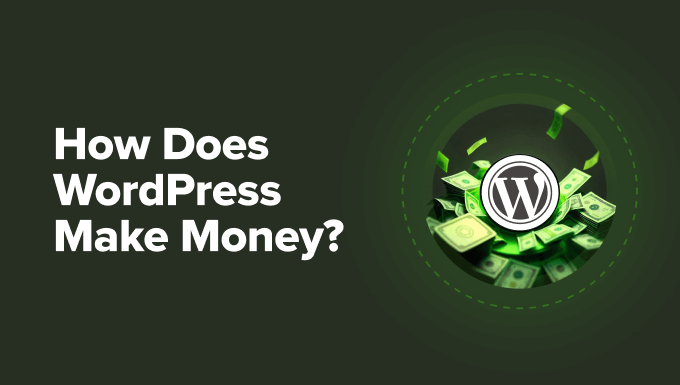
Why WordPress Ownership Matters to You
The biggest mistake I see beginners make is confusing WordPress.com with WordPress.org. This often leads to paying for features that are actually free on the self-hosted WordPress.org platform.
Others worry that because WordPress is free, it might disappear or change dramatically overnight. They wonder if they’re building their business on shaky ground.
Understanding who controls WordPress helps you avoid these costly mistakes. You’ll know exactly what you own, what you control, and what guarantees you have for the future.
When you understand the ownership structure, you can make confident decisions about your website’s themes, plugins, and hosting. You’ll know you’re on the right platform and can feel secure about its long-term stability.
With that in mind, let’s take a look at the key issues:
- What's the Difference Between WordPress.org and WordPress.com?
- Who Actually Owns WordPress?
- How Does WordPress Make Money?
- Who Owns Your WordPress Site and Content?
- What Does This Mean for Your WordPress Website?
- Frequently Asked Questions About WordPress Ownership
- Expert Guides on the WordPress Community
What’s the Difference Between WordPress.org and WordPress.com?
The confusion between these two platforms is the biggest source of misunderstanding about WordPress ownership.
Let’s take a quick look at the differences:
- WordPress.org is the free, open-source software that you can download and install on your own web hosting. It’s the self-hosted content management system that powers over 43% of all websites, and it’s what most people mean when they say ‘WordPress’.
- WordPress.com is a commercial hosting service owned by a company called Automattic. Think of it as ‘WordPress-as-a-service.’ They use the same core WordPress software but package it into their own platform with specific plans, features, and rules. 🏢
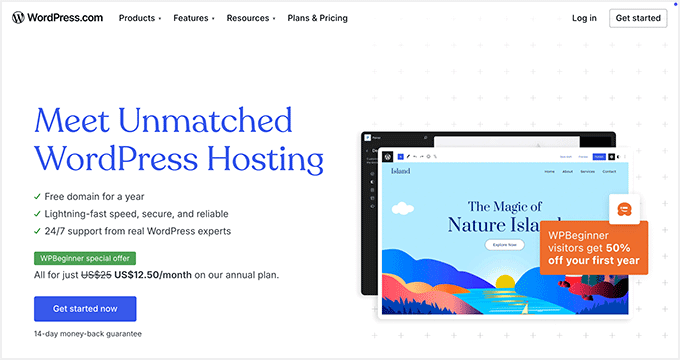
Their revenue models are also different.
WordPress.com makes money by charging for hosting, premium themes, and advanced features.
On the other hand, WordPress.org doesn’t charge anything because it’s just software you download, but you will need to organize your own hosting separately.
I’ve seen people spend hundreds of dollars on WordPress.com plans when they could have gotten more features for less money using WordPress.org with their own hosting.
The key difference is that WordPress.com controls your site, while with WordPress.org, you have complete control. This ownership difference affects everything from what plugins you can install to whether you can run ads on your site.
You should understand this difference before you build your website. For a detailed breakdown, see our WordPress.com vs WordPress.org comparison.
Who Actually Owns WordPress?
WordPress is open-source software. In simple terms, its code isn’t owned by a single person or company. It belongs to everyone and no one at the same time because it’s a community project.
Think of it like a community cookbook. The original recipe (the WordPress software) is shared freely with everyone. Anyone can use the recipe, suggest improvements, or even adapt it to create their own new dish. No single person owns the original recipe because the community does.
It’s pretty amazing that thousands of developers from around the world have volunteered their time and expertise over the years to build and improve WordPress.
The WordPress trademark and WordPress.org domain are owned by the WordPress Foundation. This is a nonprofit organization that exists to protect and promote WordPress as free software.

WordPress was co-founded by Matt Mullenweg and Mike Little in 2003. Matt Mullenweg leads the open-source project and is also the founder of Automattic, the company behind WordPress.com.
While he’s involved in both, the non-profit WordPress Foundation ensures that the free WordPress.org software is protected and remains independent of any single company’s commercial interests.
The Foundation’s mission is to ensure that WordPress will always be free and open-source. This means that even if a key person or company were to disappear, WordPress itself would live on, protected and maintained by its global community. 🤝
WordPress is licensed under the GPL. This means you can use WordPress however you want, modify it completely, or even rebrand it and sell it as your own product.
How Does WordPress Make Money?
Now here’s the part that confuses many people: If WordPress is free, how does anyone make money from it?
It’s a great question, and the answer lies in the diverse ecosystem that has grown around the WordPress software.
Automattic and WordPress.com’s Role
The most direct way money is made with WordPress (the software) is through WordPress.com. This is a commercial hosting service run by a company called Automattic.
They generate revenue by offering various hosting plans, from a free (but limited) option to powerful business and enterprise plans. They also sell premium themes, custom domain names, and other advanced features.
Automattic, founded by WordPress co-founder Matt Mullenweg, has also built an entire ecosystem of WordPress-related products.
You might know them from popular products like WooCommerce (the top eCommerce plugin), Jetpack (for security and performance), Akismet (spam filtering), and WordPress VIP (enterprise-level hosting).
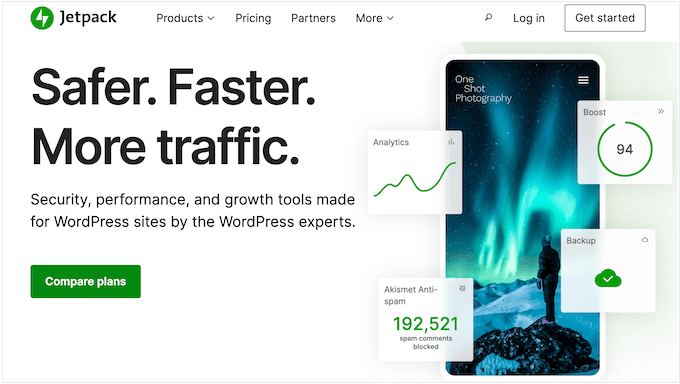
The WordPress Foundation: Protecting the Core
The WordPress Foundation, which owns the WordPress trademark and protects the open-source nature of WordPress.org, operates as a nonprofit organization.
It relies on donations from individuals and companies. It’s common for major WordPress hosting companies and plugin developers to contribute to keep the project running. This makes sure the software itself remains free.
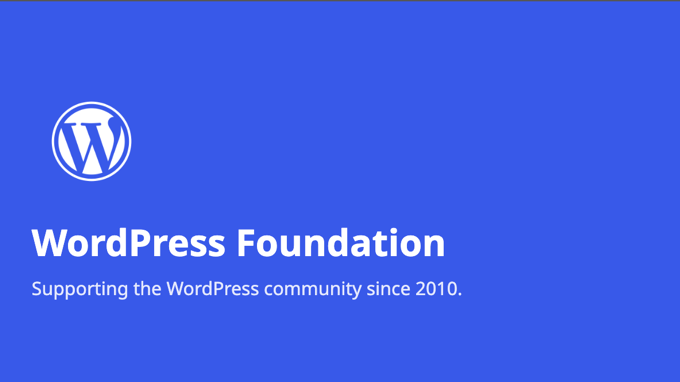
The Wider Ecosystem: Businesses Thriving on WordPress
But here’s where it gets really interesting: thousands of independent businesses make money by building products and services around WordPress.
Theme developers, plugin creators, hosting companies, and web agencies all profit from the WordPress ecosystem. Many hosting companies like Bluehost and SiteGround have grown into million-dollar businesses by specializing in WordPress hosting.
Plugin developers, like the team behind WPForms, have built successful companies selling WordPress plugins.
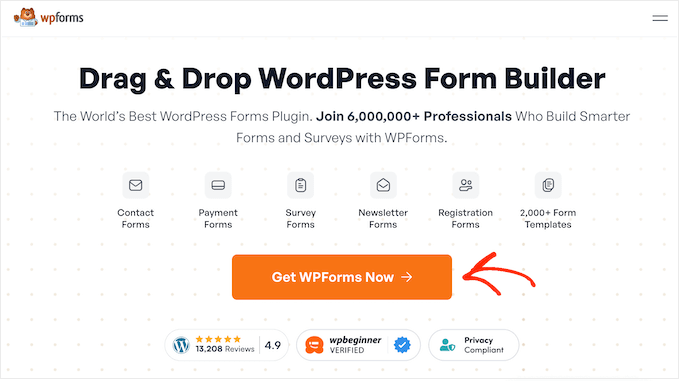
In fact, WPBeginner is also part of this amazing ecosystem. We create helpful free content for WordPress users, and we make money through affiliate commissions when you purchase products from companies we recommend.
This creates a unique situation where everyone benefits. WordPress stays free because businesses that profit from it give back to the project’s development and maintenance.
Who Owns Your WordPress Site and Content?
This is the most important question for any website owner, and the answer is simple: it depends on which platform you use.
With WordPress.org (Self-Hosted):
You own EVERYTHING. ✅
- Your content (text, images, videos)
- Your database and user data
- Your website’s design and functionality
Using WordPress.org gives you complete freedom. You can install any plugin you want, customize the code, sell products, and run ads.
You can even move my entire website to a new hosting company whenever you choose. This is true freedom and ownership.
With WordPress.com:
It’s a bit different. You own your content (like your blog posts and images), but WordPress.com owns the platform.
This means they control the hosting, the features you can use, and the rules you must follow. If you violate their Terms of Service, they can suspend your site. On their free and lower-tier plans, you are limited in what plugins and themes you can use.
This is important because if your site violates their terms of service, WordPress.com has the right to suspend it. I’ve seen bloggers run into trouble with this, which is why understanding the rules is so critical.
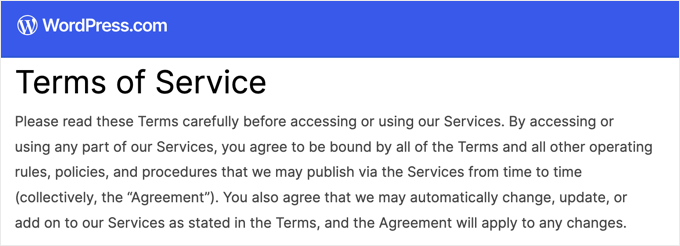
If you want to run ads, you may need to be on a higher-tier plan, and even then, they might take a share of the revenue.
This is why I always recommend WordPress.org for serious websites. You maintain complete control and ownership of everything you build.
What Does This Mean for Your WordPress Website?
Because WordPress.org is free and community-owned, you don’t have to worry about a company suddenly changing its prices or removing features you rely on. You have the stability of knowing your platform is secure for the long term.
The open-source nature means you’re not locked into any single company’s services. If your hosting company raises prices or provides poor service, then you can easily move your entire website elsewhere.
You can also feel confident investing in premium plugins and themes. Because of the GPL license, you’re never locked in. If a developer ever stops supporting a product, you have the right to hire another developer to work on it for you.
I’ve saved thousands of dollars over the years by understanding when I need to pay for WordPress services versus when I don’t. WordPress itself is free, but you’ll pay for hosting, premium themes, and advanced plugins.
The key is knowing which expenses are necessary and which are optional. Quality hosting is essential for any serious website, but you can start with affordable hosting plans and free themes, then upgrade only when your website grows.
This ownership structure also means WordPress will likely outlast any individual company or developer. Your investment in learning WordPress skills and building your website remains worthwhile for years to come.
Frequently Asked Questions About WordPress Ownership
Over the years, I’ve received countless questions about WordPress ownership and how it affects website owners.
Here are the most common questions I get, along with the answers that will help you make informed decisions about your WordPress website.
Is WordPress completely free?
Yes, the WordPress software from WordPress.org is 100% free to download and use. However, to get your website online, you need a domain name (like wpbeginner.com) and web hosting (a powerful computer that stores your site and shows it to visitors).
Think of it this way: WordPress is the house you get for free, but you still need to buy the land (hosting) to put it on and an address (domain name) so people can find you.
How does WordPress stay free?
WordPress remains free because it’s supported by a thriving ecosystem of businesses that profit from it. Hosting companies, plugin developers, and web agencies all contribute back to the WordPress project because its success directly benefits their businesses.
Can I run ads on my WordPress site to make money?
Yes, with a self-hosted WordPress.org site. You can run any ads you want and keep 100% of the revenue.
On WordPress.com, advertising options depend on your plan. Their own ad program is available on certain plans and involves a revenue share, while higher-tier plans give you more freedom to run your own ads.
Is my WordPress site data safe and secure?
The answer depends on which version of WordPress you use. With self-hosted WordPress.org, you have full control over your site’s security.
It depends on choosing a reliable WordPress hosting provider and implementing good security practices, like using strong passwords and a WordPress backup plugin.
The good news is you have full control over your WordPress security measures.
With WordPress.com, they handle much of the backend security and backups, which can be convenient, but you are reliant on their systems and policies.
What happens if WordPress ownership changes?
The WordPress Foundation and GPL license protect against major ownership changes. Even if key figures left the project, WordPress would continue as open-source software controlled by the community rather than any single owner.
Expert Guides on the WordPress Community
Understanding who owns WordPress and how it makes money gives you the confidence to build your website on solid ground. You now know that WordPress.org is truly free, community-owned software that will remain available regardless of what happens to any single company.
You may like to see some other guides about the WordPress project and community, including how you can benefit and contribute:
- What is WordPress? A Beginner’s Guide (FAQs + Pros and Cons)
- Interesting Facts About WordPress (Infographic)
- Why is WordPress Free? What are the Costs? What is the Catch?
- How Much Does It Really Cost to Build a WordPress Website?
- How You Can Get Involved With The WordPress Project
- Contributing to the WordPress Ecosystem (My Thoughts)
- How to Make New Feature Suggestions for WordPress
- How and Why You Should Leave Reviews on WordPress
- What Is a WordPress Bug Bounty Program? (& How to Get Involved)
- The Future of WordPress: What to Expect (Our Predictions)
Remember that while WordPress itself is free, you’ll need reliable hosting and may want premium themes or plugins as your site grows. The difference is that these are your choices to make, not requirements imposed by a platform owner.
Your website is one of your most important business assets. Building it on WordPress.org ensures that you’ll always have complete control over that asset, no matter how the WordPress ecosystem evolves in the future.
If you liked this article, then please subscribe to our YouTube Channel for WordPress video tutorials. You can also find us on Twitter and Facebook.





Jiří Vaněk
Recently, I was intrigued by the fact that the word “WordPress” should not be used in a domain name because it is a trademark. For example, the domain wordpress-pro-zacatecniky.com should not be used precisely because of the trademark. As for money, even though WordPress is free, it is a huge money-making factory and also a great opportunity for young, talented, and ambitious developers who can create a great plugin and build their livelihood and company on it. And that’s great. Thanks to its widespread use, WordPress provides employment to hundreds of thousands of people today. And that’s amazing.
Dayo Olobayo
This write-up cleverly highlights the various motivations that drive developers to contribute to the open source WordPress. Having survived and improved over the past 20 years, I have no doubt that the future will be even better.
Terry Maher
This article is simple and effective, which is trickier than some people might imagine, so well done!
WPBeginner Support
Glad we could make understanding this simple
Admin
Ric
You wrote that some hosting companies and others such as Yoast SEO, BackupBuddy, etc “regularly contribute back to WordPress”. Are you referring to monetary contribution? Is it mandatory for the hosting companies to pay some amount to Wordpress (I can see only 4 of them advertised on the hosting page) or are you saying they voluntarily make some monetary contribution?
You’ve also added a link to WordPress Foundation’s donations page in your article and wrote it’s their “primary source of revenue”. However I couldn’t find this link or any mention of WordPress Foundation on Wordpress.org home page or in their About or Get Involved pages. There is no “donate” button visible anywhere on their site – well at least it should be on their home page if it is their primary source of revenue.
I’m just trying to understand this whole thing more precisely. Thank you.
Editorial Staff
When we say companies like Yoast SEO, BackupBuddy, WPBeginner, etc regularly contribute to WordPress, we do so by sponsoring WordCamps. These companies also help out contributing to the WordPress core software (i.e finding bugs, submitting patches, etc).
We are not certain about the criteria for hosting companies listed on the official WordPress.org page because that’s decided by Matt Mullenweg, the founder of WordPress.
What I do know is that we as a company are not required to sponsor any WordCamp or contribute at all. But we do so because we want WordPress ecosystem to grow. I believe others do it for the same reasons.
Yes the foundation’s primary source of revenue is donation. When companies sponsor WordCamps, they’re basically donating the money to the Foundation which then distributes it to the respective WordCamps for organizational expenses and so-forth.
Admin
Paul Farmer
Thanks for the article Syed. You provided a clear separation between the two organizations. I also appreciated the points brought up in the exchange between you & Jeff that provided some additional information and perspective.
We are a new video technology company that is looking at potential options to offer our technology to the WordPress community (we are leaning towards building a free plug-in with some of the basic functionality and offer a premium version that would be based on a paid subscription, that included additional functionality, hosting of video content, enhanced tech support.). A couple of your other articles also provided valuable information to help us get a better understanding of the WordPress environment. I would certainly welcome the opportunity to connect if you are interested in providing some additional feedback/guidance offline.
Ray
At last a site to teach beginners! Brilliant. Good article, I never had a clue about the two sites so thanks for clearing that up. I have a small online shop selling products built on 1&1mywebsite bit need a more flexible site, what’s the suggestion? .com or .org
Thanks
Ray
WPBeginner Support
Definitely, self hosted WordPress.org site is the way to go.
Admin
Jeremy Rhymes
Thanks for the awesome clarity! I don’t know if this is the best place for a question, but I’m wanting to use a blog to cover local politics. My demographic is primarily my township. I do enjoy customization, but I am not sure I want to spend significant amounts of time learning to manage my site when my aim is to impact my environment politically/educationally.
With this in mind, would you have a suggestion as to which (.com or .org) I should employ?
WPBeginner Support
We assume that you would want to reach out to as many people as you could. In that case, you should start with WordPress.org. It does come with slight learning curve but its not that difficult. You may also want to see the limitations of WordPress.com
Admin
Ameena
This was an information that I wished I knew but was too lazy to find out. :), Thanks a lot, WPbeginer!
Editorial Staff
You’re welcome
Admin
Elisabeth Winkler
Thank you, WPBeginner. I have been using Wordpress.com for my food blog, and knew – vaguely – there was a difference between that and Wordpress.org…until now. Thank you for clear explanation!
Desmond Allotey-pappoe
great piece
Piet
Hang on, Soliloquy and Envira are owned by WP Beginner? When did that happen?
Editorial Staff
That happened quite a while ago (July 2014).
I wrote about it on my personal blog:
https://syedbalkhi.com/how-to-choose-the-right-business-partner-7-tips-i-have-learned-overtime/
-Syed
Admin
Mike Kozlow
I currently pay Go Daddy to host my site and I am using WP.org ‘s themes and plugins. Is there any advantage to try and host myself? My am a real estate agent.
Grant
The advantage is that it will be less expensive and you’ll have much greater control over the look and feel of things.
The disadvantage is that you’ll spend much more time setting it up, comparing themes/plugins/settings, and debugging issues when plugins conflict or your site goes down.
There are tradeoffs. Do you feel like exploring the administration side of WordPress? If not, you may just get frustrated with it, and wish you had left it in someone else’s hands.
If you do decide to host it yourself, I’ve used Digital Ocean before, and it’s been reliable. Not sure if GoDaddy allows you to host your own.
Mike Kozlow
Thanks! That answer is exactly what I needed to hear. I have enough headaches now without adding to them.
george
your typo
[asked the question in the roam of ownership of WordPress]
ROOM
Editorial Staff
Nope — in the roam of ownership but I clarified the sentence to avoid confusion
Admin
Danny Hamdani
Hey, This post is great…This answer my curious…Great post
Sangam Shrestha
Nice post. I hadn’t thought about this before. It sounds interesting.
Rick D
Excellent article.
John MacKenzie
YES! great job on this article. When I offer Wordpress (.org) to a customer, many times they point me to online platform comparisons between wordpress.com and WIX (and products like it), suggesting that a drag and drop builder is a better fit. Understanding that the full Wordpress software is a separate product with features and benefits that may be a better fit for a corporate website is essential. While the .com service and other drag and drop builder services may be great for a small portfolio or blog their is a vast chasm between the two in terms of capability and range. This article made it really clear. Thank you.
Dan Awontis
It is really informative and it helps people who don’t know that basic thing.
Jeff Yablon
That was almost perfect.
Seriously, really great explanation of the matter; best I’ve ever seen. But your spin on who owns the open source project missed in some critical ways.
Yes, the code is open-source, pursuant to GPL, which is itself a confusing issue. And yes, you almost could release a product with your own branding and “steal the code” to make a new product. But that doesn’t mean the community owns the code. Regardless of who makes it or how, their motivations, or the fact that you almost could get away with rebranding the WordPress core code as your own, that code lives at and is therefore owned by whoever owns wordpress.org.
And that’s the WordPress Foundation, which Mr. Mullenweg is the chairman of and which is mainly tasked, philanthropic efforts aside, with protecting the WordPress trademarks, FOR THE BENEFIT OF AUTOMATTIC, which Mr. Mullenweg is the majority owner of.
So, great story, but you missed a big point: in every meaningful way, Mr. Mullenweg and his venture capital partners own WordPress. “we”, (the community) do not.
Editorial Staff
Hi Jeff,
Thanks for dropping by. I’m very well aware of your circumstances and situation that you went through trying to fight a trademark violation battle.
This article clearly explains the history of who owns the trademark of WordPress and the favorable treatment of Automattic due to it’s history and contributions. No you’re not allowed to use the WordPress trademark in your for-profit ventures without permission of the Foundation (just like you can’t use Toyota’s trademarks). That’s all I’m going to say about that case. You’re entitled to your own opinion, but let’s not ruin this educational post to spread your personal agenda. I wrote this post in a neutral tone for educational purposes, not to bring out community politics & drama.
You’re absolutely 100% wrong about the ownership of the GPL code. When you rebrand / fork WordPress or any other GPL product for the purpose of re-distribution, you can do so legally as long as you also pass down the same freedoms to your users (in other words someone else should be able to rebrand / fork your project). WordPress was a fork of b2, WooCommerce was a fork of Jigoshop (and the rest is history).
The keyword above is redistribute. If you take the WordPress code, used it as a base for your SaaS project (say to sell a complete restaurant website solution), you DO NOT have to neither open-source nor license it under GPL because you’re not redistributing the software. You’re selling software as a service.
I normally don’t allow links in our comments, but I’m letting the one about your article stay, so others can read up your stance and learn more about your legal case. But my real hope in doing so is to ensure that this article does not get hijacked, and I hope you respect that request.
-Syed Balkhi
Founder of WPBeginner
P.S. For beginners: Forking is a term when a developer takes a copy of an open-source software and start independent development on it to customize / sell / distribute under a new brand.
Admin
Jeff Yablon
Syed, actually, I said that as long as GPL rules/guidelines/whatever are followed, you have quite a bit of leeway, in agreement with what the article said, so I’m not sure what you think I was wrong about.
And yes, I have a history with trademarks and WP, which is of course how I came to know about this piece and be interested in it, but I have no axe to grind; our disagreement was settled to the satisfaction of all.
As I said, I thought this was a great article. My only point was that it’s naive to believe that in PRACTICAL terms anyone other than Automattic, MaTT/The WP Foundation owns the whole thing.
TSBogdan
Thank you! I was not particulary curious about this, but one can always know more about everything!